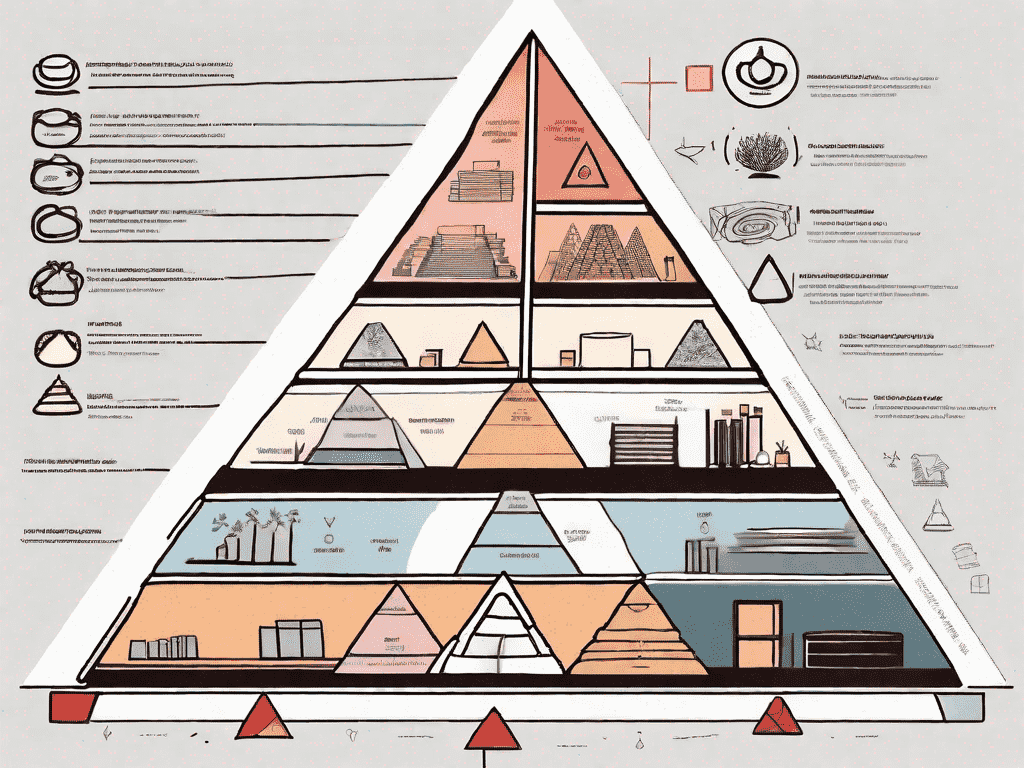
Maslow’s Hierarchy of Needs at Work: Understanding Employee Well-being
In today’s competitive business landscape, organizations are recognizing the value of prioritizing employee well-being. One theory that has gained popularity in understanding human motivation and needs is Maslow’s Hierarchy of Needs.
Understanding Maslow’s Hierarchy of Needs
The Five Levels of Maslow’s Hierarchy
Maslow’s Hierarchy of Needs represents a pyramid with five distinct levels. At the base are the physiological needs, followed by safety needs, belongingness and love needs, esteem needs, and self-actualization needs at the top.
Let’s delve deeper into each level and explore the intricate details of Maslow’s theory.
The Role of Each Need in Human Behavior
Each level of needs plays a crucial role in human behavior and motivation. Physiological needs, such as food, water, and rest, are fundamental for survival. These needs are the foundation upon which all other needs are built. Without fulfilling our physiological needs, it becomes challenging to focus on higher-level needs.
As we move up the pyramid, we encounter safety needs. These needs encompass the desire for security, stability, and a predictable work environment. Safety needs are essential for individuals to feel protected and free from harm. When these needs are met, individuals can focus on higher-level needs without constant worry or fear.
Belongingness and love needs refer to the need for social connections and positive relationships. Humans are social creatures, and the desire for companionship and acceptance is deeply ingrained in our nature. Fulfilling these needs leads to a sense of belonging and fosters emotional well-being.
Esteem needs involve the desire for respect, recognition, and a sense of accomplishment. These needs are closely tied to our self-worth and self-esteem. When individuals feel valued and appreciated, they are more likely to develop a positive self-image and have a greater sense of confidence and self-assurance.
Lastly, self-actualization needs represent the pursuit of personal growth, fulfillment, and reaching one’s full potential. This level of need is often associated with a sense of purpose and the desire to achieve one’s dreams and aspirations. Self-actualization involves continuous self-improvement, self-reflection, and the exploration of one’s passions and talents.
Understanding Maslow’s Hierarchy of Needs provides valuable insights into human behavior and motivation. By recognizing and addressing these needs, individuals and organizations can create environments that foster growth, well-being, and overall satisfaction.
Applying Maslow’s Hierarchy to the Workplace
The concept of Maslow’s Hierarchy of Needs is widely recognized and applicable to various aspects of life, including the workplace. By understanding and addressing the different levels of needs, employers can create a more fulfilling and satisfying work environment for their employees.
Physiological Needs and Job Satisfaction
Addressing employees’ physiological needs is crucial for job satisfaction. Providing fair compensation ensures that employees can meet their basic needs, such as food, shelter, and healthcare. Additionally, comfortable workspaces contribute to their physical well-being, reducing the risk of work-related health issues. Sufficient breaks throughout the workday allow employees to recharge and maintain their energy levels, ultimately enhancing their productivity and job satisfaction.
Safety Needs in the Work Environment
Creating a safe work environment is essential for employees’ well-being and overall job satisfaction. Implementing safety protocols and procedures not only reduces the risk of accidents and injuries but also instills a sense of security among employees. Offering comprehensive training programs equips employees with the necessary skills and knowledge to handle potential hazards effectively. Moreover, fostering a supportive culture where employees feel comfortable reporting safety concerns and seeking assistance further fulfills their safety needs.
The Importance of Belongingness and Love in Teams
Building strong team dynamics and encouraging collaboration are essential for satisfying employees’ belongingness and love needs. Team-building activities, such as retreats or group projects, help foster a sense of camaraderie and unity among team members. Open communication channels, such as regular team meetings or virtual platforms, create an environment where employees feel heard and valued. Recognizing individual contributions, whether through public praise or rewards, further strengthens the sense of belonging and love within the team.
Esteem Needs and Employee Recognition
Acknowledging employees’ achievements and offering opportunities for growth and development are crucial for meeting their esteem needs. Regular performance feedback allows employees to gauge their progress and make improvements, boosting their self-esteem. Merit-based rewards, such as bonuses or promotions, recognize employees’ hard work and dedication, further enhancing their sense of accomplishment and self-worth as part of a reward system for employees. Clear career progression paths provide employees with a sense of direction and purpose, motivating them to strive for personal and professional growth.
Self-Actualization in Career Development
Supporting employees’ self-actualization needs involves providing opportunities for personal growth and challenge. Enabling autonomy in decision-making and task execution allows employees to take ownership of their work and explore their full potential. Encouraging creativity and innovation fosters a culture of continuous improvement and learning. Offering learning and development programs, such as workshops or mentorship opportunities, equips employees with the skills and knowledge necessary to advance in their careers and reach their full potential.
By understanding and applying Maslow’s Hierarchy of Needs in the workplace, employers can create an environment that not only meets employees’ basic needs but also supports their personal and professional growth. This, in turn, leads to higher job satisfaction, increased productivity, and a more engaged and motivated workforce.
The Impact of Unmet Needs on Employee Well-being
In today’s fast-paced and demanding work environment, the well-being of employees is crucial for both their personal satisfaction and the success of the organization. One of the key factors that significantly affects employee well-being is the fulfillment of their needs. When employees’ needs are not met, it can have a detrimental impact on their overall happiness, productivity, and engagement.
Effects of Unfulfilled Physiological Needs
At the base of Maslow’s Hierarchy of Needs are physiological needs, which include basic necessities such as food, water, and rest. When employees’ physiological needs are not met, their well-being and performance suffer. Hunger, exhaustion, and health issues can lead to decreased productivity and increased absenteeism. Organizations that fail to provide adequate breaks, nutritious meals, and a comfortable work environment may find their employees struggling to meet their basic physiological needs.
Imagine a scenario where employees are constantly working long hours without proper breaks or access to healthy meals. Their energy levels plummet, and they become more susceptible to illnesses. As a result, their productivity declines, and they may need to take frequent sick leaves. This not only affects their own well-being but also puts a strain on the organization’s resources.
Consequences of Ignoring Safety Needs
Above physiological needs, safety needs come into play. These needs encompass physical safety, job security, and protection from harm. Neglecting safety needs can create tension and anxiety among employees. Workplace accidents, high levels of stress, and a lack of trust in the organization’s ability to provide a secure environment can adversely affect employee well-being.
Consider a situation where employees work in an environment where safety protocols are not followed, and accidents are frequent. This creates a constant state of fear and unease among the workforce. Employees may constantly worry about their well-being and the potential risks they face on a daily basis. This heightened stress can lead to burnout, decreased job satisfaction, and even mental health issues.
The Risk of Neglecting Belongingness and Love
As humans, we have an innate need for social connection and a sense of belonging. Failure to foster a sense of belonging and establish positive relationships can result in feelings of isolation and dissatisfaction. This can lead to decreased motivation, increased turnover rates, and a negative work atmosphere.
Imagine a workplace where employees feel disconnected from their colleagues and lack a sense of camaraderie. They may feel like they are just another cog in the machine, with no meaningful connections or support. In such an environment, employees are more likely to feel demotivated, unengaged, and disinterested in their work. This not only affects their own well-being but also hampers collaboration and teamwork within the organization.
The Downside of Overlooking Esteem Needs
Above the need for belongingness and love, lies the need for esteem. This includes both the need for self-esteem and the desire for recognition and respect from others. When employees’ achievements go unrecognized, their self-esteem suffers. This can lead to demotivation, decreased job satisfaction, and a lack of loyalty towards the organization.
Imagine a workplace where employees consistently put in their best efforts but receive no acknowledgment or appreciation for their hard work. Over time, they may start questioning their own abilities and lose confidence in their skills. This lack of recognition not only affects their self-esteem but also diminishes their motivation to excel. As a result, their overall job satisfaction declines, and they may start seeking opportunities elsewhere.
The Dangers of Stifling Self-Actualization
At the top of Maslow’s Hierarchy of Needs is the need for self-actualization, which refers to the desire for personal growth, fulfillment, and reaching one’s full potential. If employees’ desire for personal growth and self-fulfillment is ignored, they may become disengaged and seek opportunities elsewhere. This results in talent loss and missed potential.
Imagine a workplace where employees are not given opportunities for professional development or the chance to take on new challenges. They may feel stagnant and unfulfilled in their roles, leading to a lack of enthusiasm and motivation. Eventually, these employees may start looking for organizations that value their growth and provide avenues for them to reach their full potential. This not only leads to talent drain but also hampers the organization’s ability to innovate and adapt to changing circumstances.
By understanding and catering to employees’ needs based on Maslow’s Hierarchy, organizations can create a workplace culture that promotes employee well-being, engagement, and productivity. Prioritizing employee needs not only benefits individuals but also contributes to the overall success of the organization. When employees feel valued, supported, and fulfilled, they are more likely to thrive and contribute their best to the organization’s goals.


